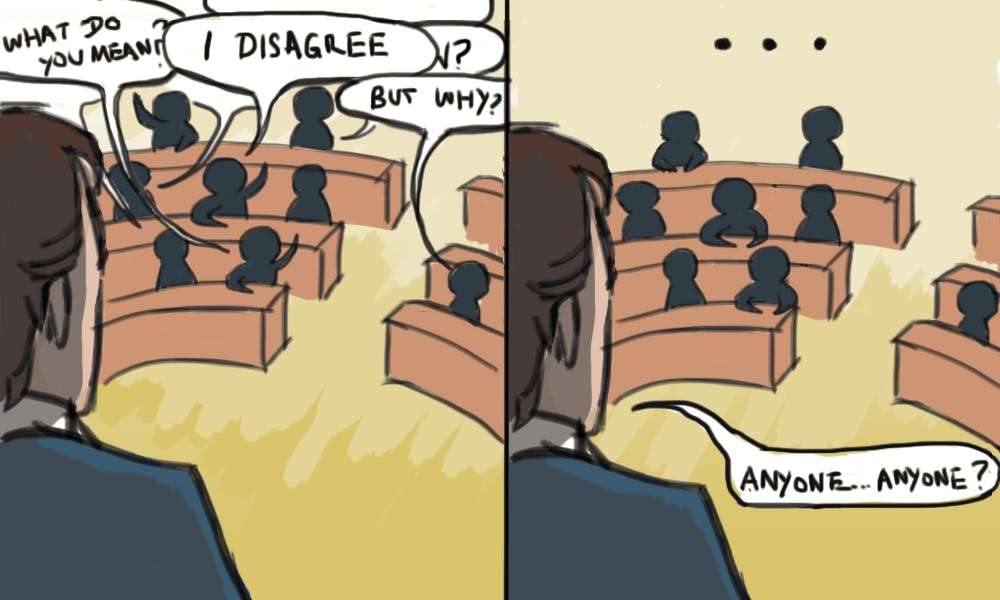I once heard a professor joke that “you can explain 80 percent of what happens in a classroom by the students’ desires to get dates.” He meant to point out jokingly that students — particularly younger ones — are often concerned with how they appear to their peers to the point that it can define how they approach and engage with their classes.
Though I’m sure we’re not (quite) as date-fixated as the joke would suggest, there is a truth to it.
Getting the full benefit out of our education requires us to engage with the class experience itself, and the awkwardness of meandering through a question you don’t quite know how to ask or the potential embarrassment of giving a plainly wrong answer in front of all one’s peers shouldn’t stop us from getting there.
I talk in my classes — and it isn’t just raising my hand to answer the professor when they ask a question. There’s a lot of room in the idea-based political thought and philosophy courses I tend to take for opinions and interpretations, and I’ve often found the ideas of my peers as interesting as the professor’s, so I try to ask questions of other students to help me sort through and inform my own process. I’d like to issue a general apology to anyone who has gotten sick of my input in a lecture they enrolled in expecting not to have some random student pose questions to the room. But, I want to believe there’s value in the classroom being more than a series of two-way relationships between professor and student.
There’s a backstory here. My freshman year, I took an intermediate-level German class taught by a professor notorious for being a stickler for German grammar and syntax (I’ll let you decide for yourself what to call that). Each class began with a dense, fast opener in full German to which one student was meant to give a detailed response.
I remember us all being fairly good speakers for our experience level, but the professor’s openers were often beyond us. Needless to say, people weren’t exactly fighting for the chance to respond. When someone was finally picked each session, there was a clunky, tense, awkward few minutes in which their response was picked apart and restructured word-by-word in front of the class. For a while, most of us were visibly uncomfortable during the process. It’s embarrassing to be put on the spot, even more so to be put on the spot in a language you’re struggling to speak conversationally.
After a few go-rounds of this, I started wondering why I — a person who is rarely embarrassed or shy of the spotlight in my personal life — was freezing up in this class. I came to realize I was only uncomfortable because of the knee-jerk reaction that this was an uncomfortable situation. The only one really judging me in those moments was myself. There were no classmates rolling their eyes that I struggled with the plusquamperfekt (don’t ask) or deciding I was inferior because I didn’t use the genitive case. Those reactions were ascribed to them by me to fuel the discomfort I thought was supposed to accompany being on the spot.

SEE MORE FROM DYLAN REIM:
So I started being wrong. Like, really wrong. And really often. The finer points of my German grammar were about as real as Krampus (he’s like an evil German Santa — Google it), so my professor had a lot to work with. But once I started volunteering and energetically going at these small discussions, I started to learn and retain so much more than I had before.
In addition to actually learning more, it seemed that the whole class was more willing to be wrong, too. If someone else volunteered first and broke the ice with a few mistakes, there would often be multiple others ready to jump in and follow suit. Some would even give perfect responses — I want to believe they went on to be German majors.
But the bottom line is: once I stopped imagining that class was a scary place full of judgment and shame where you speak only when spoken to, I began getting the real value out of the experience. That’s the energy I try to bring with me to all my classes now, and one I think we’re all capable of bringing in our own way. Ask that question. Share that opinion. Respond to a student about something they said, rather than using the professor as a go-between. Have a conversation. Put yourself on the spot until it feels natural — you’d be surprised how quick you own it.

DYLAN REIM is a College senior from Princeton, N.J. studying philosophy and political science. His email address is dreim@sas.upenn.edu. "DReim Journal" usually appears every other Thursday.



